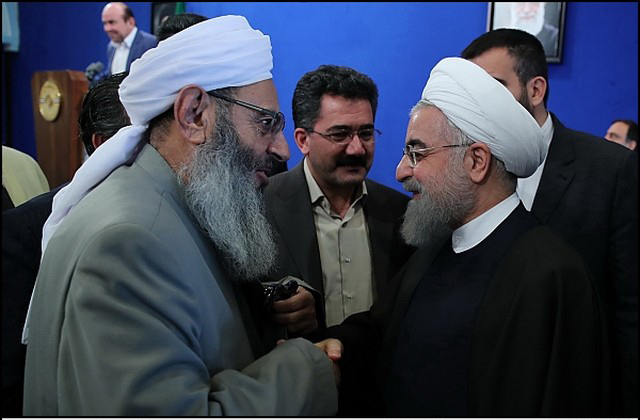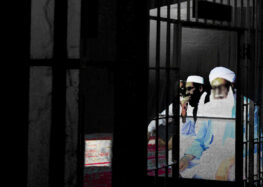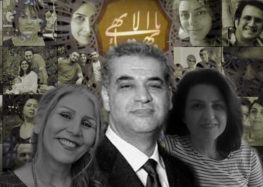Iran’s Top Sunni Cleric Urges President Rouhani to Appoint Religious Minorities to Cabinet

The leader of Iran’s Sunni population, Molavi Abdolhamid Ismaeelzahi, told the Center for Human Rights in Iran (CHRI) that Sunnis should be invited to participate in the second-term government of newly re-elected President Hassan Rouhani.
“Through interviews and articles, Mr. Rouhani has been made aware of the demands of ethnic and religious minorities, especially Sunnis,” said Molavi Abdolhamid, the Friday prayer leader of Zahedan, the capital of the Sunni-dominated Sistan-Baluchistan Province.
“Now that the elections have been held with great excitement and he has received a high number of votes, Mr. Rouhani should implement the law and end discrimination so that competent individuals from ethnic and religious minorities could be properly utilized in government,” added Molavi Abdolhamid, who endorsed Rouhani. “This would make a great impact on national solidarity and security.”
Rouhani, a centrist cleric, achieved a first-round victory on May 19, 2017.
According to Jalal Jalalizadeh, a former Sunni member of Iran’s Parliament from Sanadaj (2000-04), the capital of Kurdistan Province, there is no legal justification for blocking the appointment of Sunnis to the government.
“There’s no law or regulation denying Sunnis from taking any top posts in the Islamic Republic of Iran. With the exception of the president, who according to the Constitution must be Shia, the law does not ban Sunnis from any other position,” he said.
“However, it is the unwritten laws that prevent Sunnis from being appointed to top posts in government or as ambassadors,” added Jalalizadeh. “The president should be brave and fearless in defending the rights of minorities who voted for him.”
“In the beginning of the (1979) revolution we had a Sunni governor general,” continued Jalalizadeh. “But four decades later we only have one Sunni as deputy minister and one Sunni ambassador.”
“Sunnis have been voting for reformists since 1997,” he added. “Even though their rights continue to be denied, Sunnis have always voted for reformist candidates hoping for justice. We hope this time Mr. Rouhani will not deny the rights of Sunnis and appoint them as ministers and governors.”
Deputy Oil Minister Emad Hosseini was the only Sunni serving in a senior position in Rouhani’s first government. Saleh Adibi, Iran’s current ambassador to Vietnam and Cambodia, was the only Sunni in the diplomatic corps.
“If Mr. Rouhani cannot defend the rights of those who supported him, he should not have become a candidate in the first place,” the former MP told CHRI. “More than six million Sunnis voted for Mr. Rouhani in this election. That’s a quarter of his votes. Taking basic political and ethical norms into consideration, a quarter of the cabinet should be filled with Sunnis. Now, that’s not what we are asking, but he should at least appoint one Sunni minister.”
“The world did not turn upside down when a Sunni was appointed deputy minister for the first time,” he said.
According to Article 115 of the Constitution, the president must be a Shia. However, Article 12 states: “The official religion of Iran is Islam and the (Shia) Twelver Ja’fari school, and this principle will remain eternally immutable. Other Islamic schools, including the Hanafi, Shafi’i, Maliki, Hanbali, and Zaydi are to be accorded full respect, and their followers are free to act in accordance with their own jurisprudence in performing their religious rites. These schools enjoy official status in matters pertaining to religious education, affairs of personal status (marriage, divorce, inheritance, and wills) and related litigation in courts of law. In regions of the country where Muslims following any one of these schools of fiqh constitute the majority, local regulations, within the bounds of the jurisdiction of local councils, are to be in accordance with the respective school of fiqh, without infringing upon the rights of the followers of other schools.”
In October 2016, the Sunni block in Parliament asked Rouhani to consider Sunnis for his next cabinet reshuffle.
“In the (2013 presidential) election, 80 percent of the country’s Sunnis, including Kurds, Turks and Baluchis, voted for your slogans and programs in support of utilizing good Sunnis in the cabinet and in key government positions,” said the block in a statement.
In an August 2013 sermon, immediately following Rouhani’s first presidential election, Molavi Abdolhamid discussed efforts by Sunni dignitaries aimed at convincing Rouhani to incorporate at least two Sunnis into his cabinet.
“However, Mr. Rouhani’s close advisers believed any Sunni ministerial appointment would be opposed by Parliament,” added the Sunni cleric. “Nevertheless, we said Mr. Rouhani should go ahead and introduce a Sunni minister and vigorously defend him in Parliament. Then, if he was turned down, the guilt would be on Parliament.”





